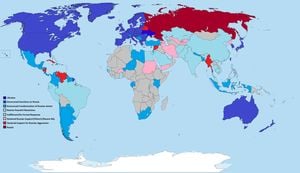Elon Musk’s recent email to federal employees has stirred significant conversation and concern, as he now requires them to justify their productivity or face the threat of job loss. This move has intensified scrutiny around performance reviews within government roles.
According to multiple reports, Musk has requested federal workers to provide detailed accounts of their weekly accomplishments. The initiative appears to be part of Musk's broader push for enhanced performance and accountability, particularly now as he aims to bring his renowned management style to the federal workforce.
This directive has been met with mixed reactions. Some employees see it as a motivational tool, encouraging workers to take ownership of their contributions, whereas others view it as added pressure exacerbated by fears of job security. "We are treated like corporate drones, where every hour spent can be questioned," commented one employee who requested anonymity. They expressed concern about the level of oversight and whether such scrutiny fosters real productivity or merely stress.
The email arrived shortly before the customary performance review period typical within federal positions. This timing raises questions—are the reviews being altered to reflect Musk's mandates, or is it merely coincidental? Given Musk’s reputation for rigorous standards, many are unsure how this will play out moving forward.
Historically, the federal workforce operates under established guidelines characterized by structured performance evaluations, predetermined criteria, and policies emphasizing job security and lifelong employment. Musk’s abrupt changes bring a stark departure from this norm.
Individuals engaged with the federal government are seeing the pressure mount amid discussions on productivity and workplace accountability. Critics argue these new mandates could undermine morale and create hostility among team members. Musks's approach of requiring incessant justification may not align with the inherent stability federal employees often expect.
To contextualize the responses, federal jobs have typically provided security and stability. Many employees previously viewed their positions as relatively safe, regardless of the fluctuation of political climates or overall economic conditions. Musk’s sudden push for performance reports might jeopardize this long-standing perception.
Federal employees, already anxious about job volatility due to shifting governmental agendas, now find themselves walking on eggshells. Some fear it could initiate larger-scale layoffs, should the results of these evaluations not meet Musk’s standards. "It’s like dangling the axe over our heads constantly—who wants to go to work with such anxiety?" said another federal worker impacted by this new directive.
The current situation raises key inquiries—how will these performance evaluations be structured? What metrics will be deemed acceptable? Who will make final decisions on job preservation? These systemic changes may take time to iron out and will likely generate waves of discourse among employees and stakeholders alike.
According to industry experts, this level of intensity can potentially backfire. More traditional methods of evaluation tend to not just focus on immediate outputs but also on collaboration, innovation, and employee growth over time. A focus solely on weekly production could marginalize those facets, posing challenges to both management and the employees obliged to conform to new standards.
While the email commands attention toward efficiency, there’s skepticism over whether such extreme oversight will yield the desired results for operational improvements or merely instigate unrest within the ranks. The looming performance reviews could become divisive, fostering competitive rather than cooperative work environments.
Such developments within federal operations spotlight Musk’s unconventional method of leadership. Many continue to question if this direction serves long-lasting benefits for the federal system, particularly when it’s often structured around serving and protecting citizen welfare rather than corporate efficiency.
For now, federal employees are bracing for unprecedented evaluations of their performance, grappling with the technological overlord’s demands and contemplating the impacts on their roles moving forward. With Musk at the helm of these changes, all eyes are on how the shift will reshape the traditional federal work environment. Employees are advised to remain proactive, as job security now dances precariously on the balance of productivity reports.



